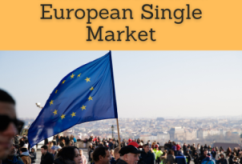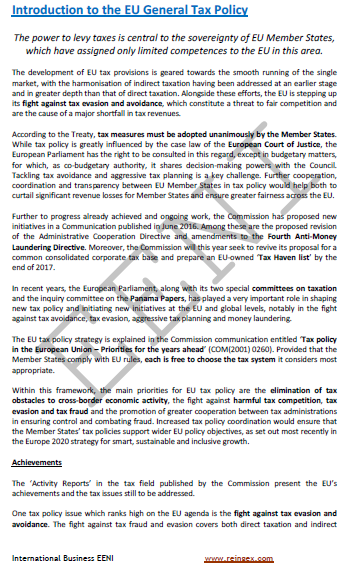Taxation in the EU Single Market

Taxation system in the European Single Market (EU)
- Introduction to the Fiscal Policy of the EU
- Taxation System in the European Single Market
- Elimination of the existing fiscal barriers
- Direct taxes: taxation of natural persons and companies
- Measures to avoid tax evasion and double taxation
- General rules on VAT
- Cross-border VAT
- Excise taxes
- Cross-border dividend distributions
The objectives of the subject “Taxation in the European Single Market (EU)” are the following:
- To understand the principles of the European Fiscal Policy
- To analyze the taxation in the European Single Market
- To know the general rules on VAT in the EU

The Subject “Taxation in the European Single Market (EU)” belongs to the following Online Programs taught by EENI Global Business School:
Masters: International Business, Foreign Trade.
Languages:  or
or  Fiscalidad en la UE
Fiscalidad en la UE  Fiscalité dans le marché unique UE
Fiscalité dans le marché unique UE  Fiscalidade no mercado único UE.
Fiscalidade no mercado único UE.
Masters adapted for  EU Students.
EU Students.

Sample - Taxation in the European Single Market (EU):

The EU has no competences on tax policies, as it is the responsibility of each country.
The EU, however, has a major role in overseeing all the laws and regulations of the different countries to ensure that they are fully compatible with the EU Policies and do not distort the single market (free movement of goods, services and capitals).
EU Member Countries: Austria, Belgium, Bulgaria, Croatia, Cyprus, Czech Republic, Denmark, France, Estonia, Finland, Germany, Greece, Hungary, Ireland, Italy, Latvia, Lithuania, Luxembourg, Malta, Netherlands, Poland, Portugal, Romania, Slovakia, Slovenia, Spain and Sweden.
(c) EENI Global Business School (1995-2024)
We do not use cookies
Top of this page



